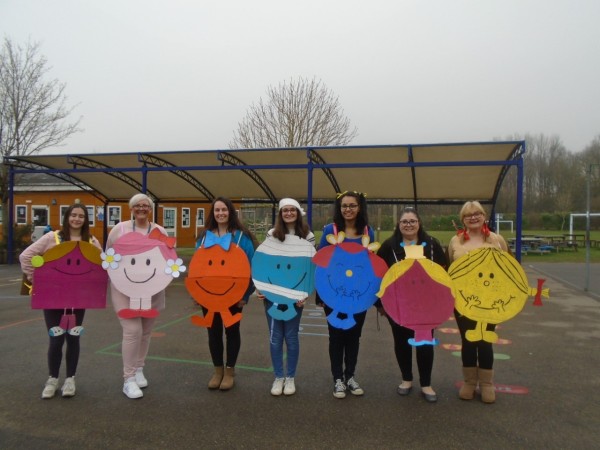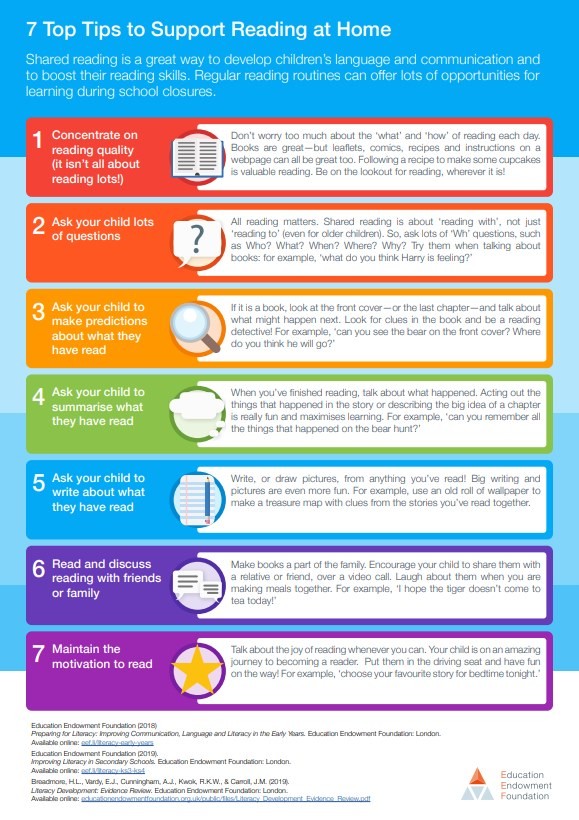Reading at The Discovery School
At The Discovery School, we understand the important role reading plays in the lives of our pupils and how it can impact on all other areas of the curriculum. We believe that reading feeds pupils’ imagination and opens a treasure-house of wonder and joy for curious young minds. It is therefore our aim that, by the end of their primary education, all pupils at our school are able to read fluently and with confidence, in all subjects and be able to read a range of genres. We aim to foster a love of reading and we encourage children to read a wide range of books both at school and at home. We have high expectations of children and the progression of their reading skills. Therefore, we offer as many opportunities for reading as we can. This may happen in the English lessons or across the curriculum.
At The Discovery School, we promote a high standard of reading and although our approaches to teaching are reviewed regularly, we expect children to leave Year 6:
• able to read easily, fluently and with good understanding,
• having developed the habit of reading widely and often, for both pleasure and information,
• having acquired a wide vocabulary, an understanding of grammar and knowledge of linguistic conventions for reading, writing and spoken language,
• able to write clearly, accurately and coherently, adapting their language and style in and for a range of contexts, purposes and audiences modelled in their reading,
• able to use discussion in order to learn; they should be able to elaborate and explain clearly their understanding and ideas, supported with evidence from the text,
• able to be competent in the skills of speaking and listening, asking and responding to questions and participating in discussions, demonstrating understanding of what they have read.
How is reading taught at The Discovery School?
Whole class reading
Children are given opportunities to listen to reading and comment on books and stories during whole class sessions. This is teacher led and the children interact and respond to differentiated questions, often during English lessons but also across the curriculum. Most classes use shared texts to base their English work around.
Shared reading
During English lessons the children are given a variety of text types as a stimulus for writing. The teacher and children share the text and the teacher models as an expert reader, drawing out the key elements of the content.
Phonics
Phonics is taught daily in EYFS and Key Stage 1 and discretely through continuous and enhanced provision.
Please see the Phonics page for more information.
Guided Reading
Guided Reading takes place as a whole-class or in small groups, with a teacher or teaching assistant, and focuses on developing children’s ability to become independent readers, thinkers and learners. In our guided reading sessions we ensure the children are reading fiction and non-fiction texts.
Guided Reading sessions focus on these key skills for reading:
• literal skills (answers can be directly lifted from the text),
• deductive skills (the text does not directly give the answer but we can work things out from the information given),
• inferential skills (the text does not directly tell us the answer but we can work things out by considering the hints and clues in the text in light of our own knowledge and experiences),
• evaluative skills (giving personal opinions, often about whole texts, or successes of author in creating mood, character etc...).
Please see our the document below for further information of how this looks in each year group
How does the school promote a love of reading?
D.E.A.R
D.E.A.R stands for Drop Everything And Read! This is an important part of the day for classes at The Discovery School, as children have the opportunity to stop what they are doing and have a story read to them or read by themselves. This is one of the ways we promote a love of reading!
World Book Day
Every year, we enjoy celebrating World Book Day together. Teachers plan a variety of fun, exciting activities for this day, themed around books. Children are usually able to dress up as their favourite book character, which also helps bring books to life for them! Below are some photos from our latest World Book Day showing the children and adults getting involved and sharing their love of reading!

Book Fairs
At The Discovery School, we are proud to host our fantastic books fairs! The children love browsing and choosing a new book to take home from the book fair.
Reader of the Week
Every week, in Celebration Assembly, the children in EYFS, KS1 and Lower KS2 are awarded certificates for fantastic reading. In Upper KS2, the children are awarded Reading Plus certificates, which are given to them.
Class Readers
Each class always has a class book, which they will be reading together. This is a fantastic time for the children to be able to listen to a book being read to them, just for enjoyment. This book will often be chosen around the children's interests. Our 'Class Readers' are on display on each classroom door!
Book Corners
Every class has their own book corner in their classroom. The book corners help to promote a love of reading and are comfortable, inviting places for the children to sit and read or go to choose a book. The books in the book corner are appropriate for the Year Group that the child is in and organised in a way that they can choose the right book for them.
Our Library
Our school library is a non-fiction reference library, where children are able to go to choose books to support their learning. The library has an area for groups to work in and is organised so the children can learn to understand the 'Dewey Decimal System' of classification. Our library also has an 'Audio Visual Station', which supports the children with their music learning and is a lovely place for the children to sit and work in a group on their musical skills!
Below is a video created by the children, which explains how our library should be used!
How can I support my child with reading at home?
Below are some top tips from the Education Endowment Foundation about how to support your child with reading.

Useful websites and games
https://readingeggs.co.uk/
https://www.phonicsplay.co.uk/
https://www.phonicsbloom.com/
https://www.readwithphonics.com/
https://www.bbc.co.uk/bitesize/topics/zs44jxs
Bug Club - https://www.activelearnprimary.co.uk/login?c=0
UKS2 only - https://student.readingplus.com/seereader/api/sec/login
For further help and advice about reading, please contact your child's class teacher.
Reading Tree Spines
Please find below links to the Year 3, 4, 5 and 6 Reading Tree spines that include high quality texts that children have access to and are encouraged to read.
